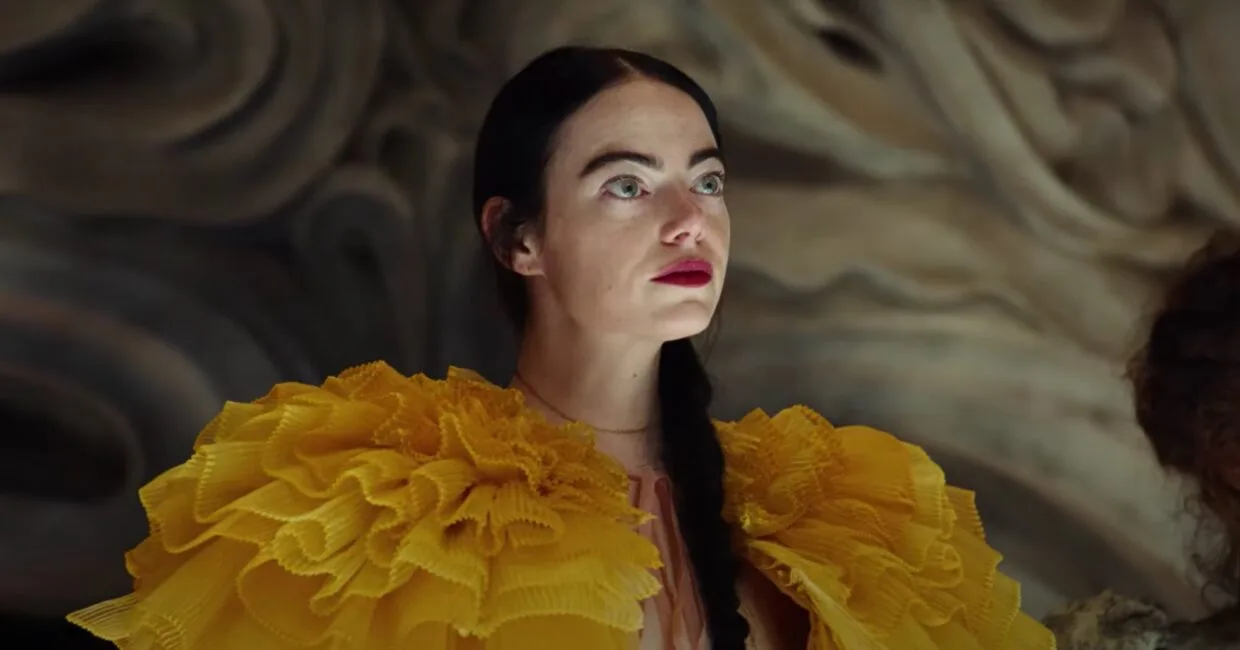
Accomplished scientist Godwin Baxter (Willem Dafoe) gives new life to Bella (Emma Stone), a recently deceased young woman, via a brain transplant and some good old fashioned, Frankenstein-style electrical charge. In order to track Bella’s development, “God” enlists the help of student Max McCandles (Ramy Youssef) and Max comes to fall for Bella’s unfiltered view of existence.
An agreement is struck which will see Max and Bella married, and so the legal services of Duncan Wedderburn (Mark Ruffalo) are employed to ensure the paperwork is all in order. However, Wedderburn is so taken with Bella that he suggests the two of them run off together for an adventure in Lisbon…
The latest button pusher from Yorgos Lanthimos is – thankfully for me at least – less performatively, nudgingly odd than, say, The Killing Of A Sacred Deer and the surreal nature of the story (adapted from the novel by Alasdair Gray) immediately lends itself to the general weirdness on screen and to the giddy cinematography of Robbie Ryan.
Underpinning the sci-fi fantasy trappings is a story of a woman fighting to gain agency in a quasi-Victorian, male-dominated society and Stone is phenomenal as the rapidly evolving Bella, leaving a trail of beguiled and/or terrified men in her wake. Her uninhibited performance is one of the most indelible I’ve experienced, the initial physical comedy and some gruesomely chucklesome scalpel abuse giving way to a considered, self-educated, formidable presence whose grip of sexual politics may prove as troubling to the audience as it is to those in her orbit.
The supporting cast is top class, most notably Ruffalo, playing a debauched type whose edifice of next level caddishness is steadily eroded by a force of nature. He’s sleazy, foul mouthed and shamefully hilarious. Youssef supplies the voice of ethical reason and Dafoe, under a layer of prosthetics, provides a spicy Scottish accent and an affecting portrayal of an outsider striking out in his own way, despite hideous damage, both physically and psychologically.
As the adventure unfolds and expands geographically, there’s time for leisure, for several spots of drinking and gambling, and for other memorable characters to drift in and out of the tale, including Rainer Werner Fassbender alumnus Hanna Schygulla as the wily Martha, Jerrod Carmichael as the cynical, philosophy-averse Harry and an astonishing Kathryn Hunter as the complex Madame Swiney. Even in a yarn with so much focus on its main protagonist, everyone is given the opportunity to make their mark.
In these times of column inches being given to how sex scenes are no longer necessary in movies, Bella’s antics are more than likely to give a few folks an attack of the vapours but, for all the nudity and, as our protagonist likes to call it, “furious jumping,” Poor Things is decidedly unsexy, considering the amount of flesh on view. As with other Lanthimos projects, there’s a certain amount of built-in uncomfortableness, but the playful approach of the piece tends to mitigate the more troublesome moments, coupled with the fact that Bella, for all of her awkwardness, exerts a level of control which nullifies the potential threat attached to otherwise precarious situations.
In contrast to the icky moments, which also include some bizarre and grotesquely comic body horror, the production design by James White and Shona Heath is breathtakingly gorgeous, building a steampunk-inflected world where trams whistle overhead in a Portuguese capital city brimming with architectural and artistic clashes. The sequence in which Bella takes a wander around the neighbourhood is a triumph of jaw dropping, detailed set construction and carefully deployed, digital flourishes. Even if the rest of the film isn’t to your taste, this mini tour ought to impress in terms of the sheer craft on display.
As to the fact that the UK version of Poor Things has been edited to amend one specific vignette in a Paris brothel, the changes aren’t noticeable and don’t affect the flow of the scene, the impact or the queasy comedy, of those few moments. As someone who hasn’t exactly been the biggest defender of the BBFC in the past (don’t get me started on Video Nasties), the cuts were in line with legal requirements and Disney, the distributor, agreed to make alterations following an advisory screening, so don’t be marching to the classification board to complain. At least not this time.
Despite the questionable behaviour demonstrated time and again across the two hours and twenty-one minutes of Bella’s odyssey, this a movie which celebrates the generosity of the human spirit and consistently suggests that a good heart and a willingness to do the right thing will ultimately bring its reward. Yes, there’s a point at which Bella decides that she must punch a baby but trust me, this is much better natured than I had expected. The baby punching? It doesn’t happen (apologies for the spoiler) and there’s context to be considered. Don’t be marching down to the nearest baby. Ever.
Poor Things, while edging Lanthimos closer to the mainstream, still contains content that will turn people off, weird people out, or both. Dialogue I found to be hilarious will set others on edge. Using various sexual encounters to thrust the plot forward may have folks heading to the exit. What cannot be denied is a turn from Stone that is not only a career best, but should be talked about for years to come. Also, as a fan of pastéis de nata, it’s a delight to see her attacking those delicious custard tarts with the gusto advised by Wedderburn.
Eccentric, frequently delightful and strangely sweet, despite the fact that the c-word gets an outing not one but five times, Poor Things could not be a better start for UK cinema releases in 2024. Let’s hope that we can see movies of this quality across the entire year.
Poor Things (2023) is in cinemas now.
